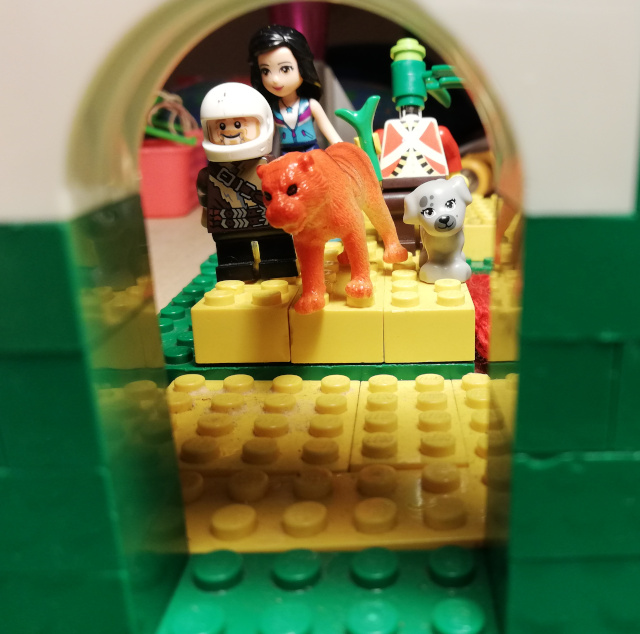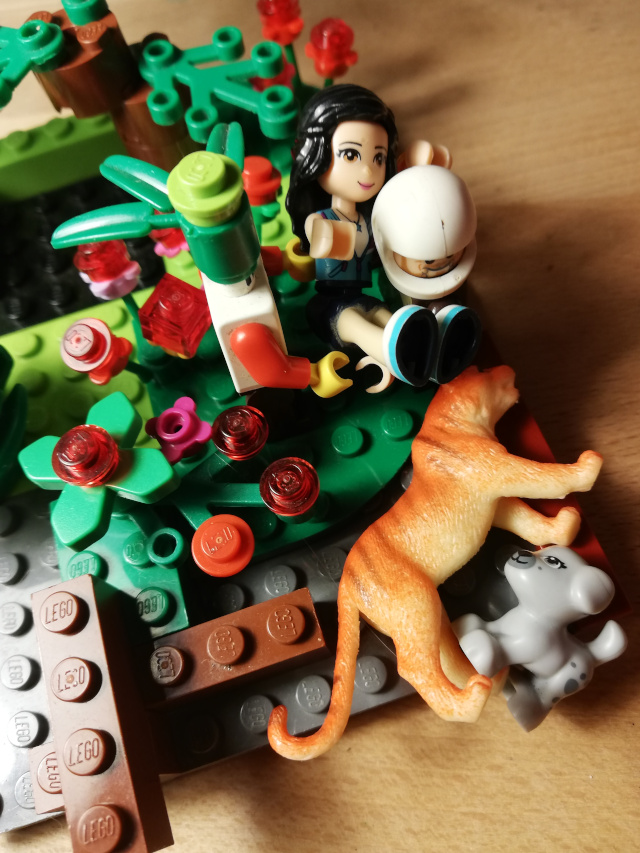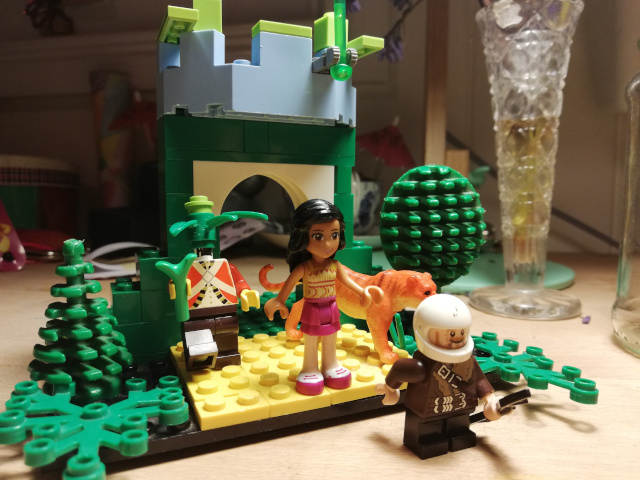Have you heard the story of the girl called Dorothy, who gets taken away on a tornado? The story is about enslavement and what can happen if you follow wicked people.

‘Dorothy and Friends’ by Eugenie Hall
This is a task in reading comprehension I do with Dad on Mondays and Tuesdays. It is a conversation between Dad and the story and me.
Dad: Tell me about who you met in the opening chapter (p.15-16)?
Albert: Henry and Dorothy and Em live in a small house in Kansas which contains only one room.
Dad: What is going on? Why are these people together?
Albert: The young Dorothy really laughs for everyone because Em and Henry are tired, and worn grey by a life on the land. Early in life children are joyful for their parents. The true gift of children, the only gift children have for others, is joy.
Dad: What was said that made you come to that conclusion?
Albert: Em can’t laugh, but Dorothy always laughs.
Dad: Who else did we meet?
Albert: Toto.
Dad: What’s the central event of this chapter? (p. 19-21)
Albert: The house gets sucked up by the cyclone. Dorothy flies to the land of the Munchkins. She takes to the outside only to be met by a witch and a bunch of Munchkins. [The Munchkins] say that Dorothy saved them from the Witch of the east. She was a cruel ruler of the Munchkins when she was killed by the house. The Munchkins can’t save themselves because they need help from their rulers. Rulers are witches, not Munchkins.
Dad: So the Munchkins cannot be rulers?
Albert: Yes
Dad: Why can’t they be rulers of themselves?
Albert: They have come to accept their given place in society.
Dad: What’s the evidence that suggests this?
Albert: The Munchkins don’t speak.
Dad: Does this picture illustrate what you mean (p.22-23)?
Albert: Yes, because th Munchkins are followers. They are waiting for a saviour. The land is green and full of animals, unlike Kansas. The green [of Oz] represents life and the grey [of Kansas] represents death.
Dad: You’ve got the hang of this. You read a chapter and then tell me your thoughts.
Baum (p. 24): The feet of the dead Witch had disappeared entirely, and nothing was left but the silver shoes. “She was so old,” explained the Witch of the North, “hat she dried up quickly in the sun. That is the end of her. But the silver shoes are yours."
Albert: That Dorothy has the slippers on, because the witch was dried up. Young Dorothy was blessed for her journey. The book is for children that are in the United States, not Australia.
Baum (p. 25): When dorothy was left alone, she set about making ready for the journey to the City of Emeralds. She had only one other dress, which was hanging on a peg beside her bed. The girl dressed herself in clean gingham with checks of white and blue, and tied he pink sunbonnet on her head.
Albert: The girl gets dressed like a woman because she must save herself.
Baum (p. 26-7):The houses of the Munchkins were odd-looking dwellings, for each was round, with a big dome for a roof. All were painted blue, for in this country of the East, blue was the favourite colour.
Albert: She walks to the wizard’s house by following the yellow brick road. The Munchkins live in small round houses because they fear to be different. The only different house was the one with a party.
Baum (p. 28-9):When Boq saw her silver shoes he said, "You must be a great sorceress."
"Why?" asked the girl.
"Because you wear silver shoes and have killed the Wicked Witch. Besides, you have white in your frock, and only witches and sorceresses wear white."
Albert: The Munchkins believe Dorothy is the saviour giving freedom to them. The truth is that freedom is in striving to be free, not waiting for Dorothy. The Munchkins believe Dorothy is a friend by what she wears but that is wrong too.
Baum (p.30-1):“That is true,” said Scarecrow. “You see,” he continued confidentially, “I don’t mind my body being stuffed, because I cannot get hurt. But I do not want people to call me a fool, and if my head stays stuffed with straw instead of brains, as yours is, how am I ever to know anything?"
Albert: Scarecrow is brainless so only wants thoughts like the girl’s. The body of scarecrow is created by straw so can’t be broken by force. The scarecrow’s struggle is a lack of thought. Giving scarecrow brains will be his destruction because scarecrows don’t think, humans do. The desire to be human is a desire to not be himself.
Baum (p. 32-3):The Scarecrow listened carefully, and said, "I cannot understand why you should wish to leave this beautiful country and go back to the dry, gray place you call Kansas."
"That is because you have no brains," answered the girl. "No matter how dreary and gray our homes are, we people would rather live there than in any other country. There is no place like home."
Albert: The Scarecrow is hearing about why Dorothy wants to go home. The sad thing for Dorothy is her need for a home that does not meet her needs. The truth of the matter is that scarecrows function in fields of grain, giving food to humans. The arrogance of Dorothy is that she knows what thinking is. The scarecrow is a foreigner to Kansas so can’t know what Dorothy is talking about. Real freedom comes from accepting the reasoning of others; others who have experiences other than yours. The scarecrow is going to have to give Dorothy some advice about why scarecrows cant eat anymore. The truth is dead people have no need for food.
Baum (p. 35):Dorothy at once ran back to the cottage and returned with the oilcan. “Oil my neck, first,” said the Tin Woodman. So she oiled it, and as it was quite badly rusted, the Scarecrow took hold of the tin head and moved it gently from side to side until it worked freely, and then the man could turn it himself.
Albert: The tinman is great at chopping down trees but can’t wear his suit without oil. The tinman must have oil to exist so depends on the girl to survive. He is a tinman that can’t be free without others.
Baum (p. 36-7):The Tin Woodman told his story..."While I was in love I was the happiest man on earth; but no one can love who has not a heart, and so I am resolved to ask Oz to give me one."
"All the same," said Scarecrow, "I shall ask for brains instead of a heart; for a fool would not know what to do with a heart if he had one."
"I shall take the heart," returned the Tin Woodman, "for Brains do not make one happy"
Albert: The tinman tells his story about giving his heart to a girl but the witch took it away. The tinman thinks the heart is everything and he is right. Hearts give trouble to those that hate giving. The tinman needs a heart because he needs others to exist. The friends of tinman are not his friends for the right reasons because they think he is stupid for needing the heart. Great things come from heartfelt decisions. Understanding needs a scarecrow and a tinman.
Baum (p. 38-9):"I didn't bite him," said the Lion, as he rubbed his nose where Dorothy had hit it.
"No, but you tried to," she retorted. "You are nothing but a big coward."
"I know it," said the Lion, wiping a tear from his eye with the tip of his tail. "It is my great sorrow. Whenever there is danger, my heart begins to beat fast."
The lion is not cowardly! Why does Dorothy think that? The greatness of lion is the honesty of his response to Dorothy. Real courage is complete honesty. Dorothy sees cowardice as a reaction to dangerous encounters, not the honesty of feeling. She’s wrong.
Baum (p. 40-41):"Do you think Oz could give me courage?" asked the Cowardly Lion.
"Jast as easily as he could give me brains," said the Scarecrow.
"Or give me a heart," said the Tin Woodman.
"Or send me back to Kansas," said Dorothy.
Albert: The Land of Oz offers salvation to the scarecrow, lion and tinman but real salvation comes from wanting the truth to be told. Looking to a wizard to save you is like opening up your faults to the world and quitting the fight. The wizard fixes up faults for a fee. The truth is in accepting the faults.

‘The Poppy Field’ by Eugenie Hall
Baum (p. 42-3):Soon they found themselves in the midst of a great meadow of poppies. It is well known that when there are many of these flowers together their odor is so powerful that anyone who breathes it falls asleep
Albert: The poppies are a sign of worldly frailty. The flowers are really dangerous but they are beautiful at the same time. The frailty of flowers is in their delicateness and their beauty. The trust lion has in Dorothy is dangerous for lion.

‘At the Gates of the Emerald City’ by Eugenie Hall
Baum (p. 48-9):I am the Guardian of the Gates, and since you demand to see the Great Oz I must take you to his palace. But first you must put on spectacles, because if you did not wear them, the brightness and glory of the Emerald City would would blind you.
Albert: Having glasses on to see the great Oz is a falsehood because glasses dont show true colour. they show the viewer an illusion of reality. I think everything that is green symbolises whether or not we can be free.
Baum (p. 52-3):The soldier now blew upon a green whistle, and at once a young girl, dressed in a pretty green silk gown, entered the room.
Albert: The girl they meet is a servant like Dorothy. She dresses the same, has the same gown, but is a servant of the wizard. The servant girl only gets told to do things. She is trapped with the wizard.
Baum (p. 53): The voice said, "Where did you get the silver shoes?"
"I got them from the Wicked Witch of the East, when my house fell on her," she replied.
Albert: The shoes are freedom for Dorothy because she has had an exchange with the Witch on equal terms.
Dad: You’re banging the table. Why are you getting cross?
Albert: The book is a work of fiction and I am sick of it.
Dad: Well I find it exhilarating listening to your take on it.
Albert: You need to make me some toast.